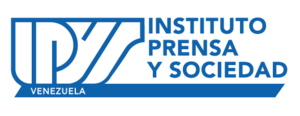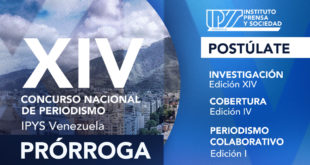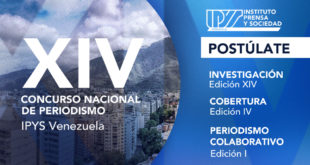El 09 de enero de 2013, por presuntamente incitar al “desconocimiento de las autoridades legítimamente constituidas”, y generar “zozobra”, y “alteraciones del orden público”, la Comisión Nacional de Telecomunicaciones (Conatel), dependencia ejecutiva encargada de la regulación de las actividades de telecomunicación en el país, abrió un procedimiento administrativo sancionatorio a la planta televisiva privada Globovisión. Esta investigación se realiza por la difusión de 4 micros audiovisuales referentes a artículos de la Constitución Nacional, y comparaciones de declaraciones de autoridades del Estado Venezolano.
Para Conatel, la divulgación de estos contenidos por parte de Globovisión podría considerarse como una “presunta conducta infractora”, debido a que pudiesen “promover el odio o las intolerancias por razones políticas, hacer apología o incitar a las alteraciones del orden público, fomentar la zozobra en la ciudadanía o alterar el orden público; o que se desconozcan a las autoridades legítimamente constituidas, podrían ocasionar una importante lesión al interés público, la soberanía y la seguridad de la nación”. Así se desprende de la notificación entregada al canal, de manera personal, por una comisión de Conatel, alrededor de las 7:30 p.m. (http://www.conatel.gob.ve/files/NotificacionGlobovision09012013.pdf).
La notificación, también, establece que Conatel prohíbe a Globovisión la difusión de los 4 micros u otros contenidos similares a estos, en su programación habitual, así como en los programas de Producción Nacional Independiente (producciones de terceros que se transmiten de manera obligatoria según las disposiciones de la Ley de Responsabilidad Social en Radio y Televisión).
En rueda de prensa, Pedro Maldonado, director de Conatel señaló: “Producto de una verificación y de un análisis realizado durante los meses de diciembre y enero se observó que el canal Globovisión ha transmitido una serie de micros y mensajes con grabaciones de alocuciones de tomas de posesiones del presidente de la República, la alocución del presidente del 08 de diciembre, con el artículo 231 de la Constitución de la República de Venezuela y luego de revisiones de orden técnico y jurídico, Conatel decidió iniciar este procedimiento al canal por estar presuntamente incurso en los ilícitos administrativos que establece el artículo 27 de la Ley de Responsabilidad Social” (http://www.conatel.gob.ve/#http://www.conatel.gob.ve/index.php/principal/noticiacompleta?id_noticia=3209).
Por su parte, el consultor jurídico de Globovisión informó en una transmisión en vivo al momento de recibir la notificación, que esta televisora no fue convocada a la rueda de prensa ofrecida por Conatel, en la cual se anunciaba este procedimiento. Agregó que por otras vías no oficiales, el medio se enteró de esta convocatoria, y cuando el equipo reporteril del canal llegó al lugar, la actividad de prensa ya había culminado y no pudieron obtener la información ofrecida por el ente regulador. Explicó que estas limitaciones del acceso a la información pública, son recurrentes, debido a que existe una discriminación arbitraria puesto que el canal, en muchas oportunidades, no recibe convocatorias de prensa para cubrir las actividades de prensa de diversas dependencias de los poderes públicos.
Antela, también, señaló que éste es el octavo procedimiento administrativo que inicia Conatel contra Globovisión, medio que mantiene una línea crítica de la gestión gubernamental actual en el país. En uno de ellos se le aplicó una sanción administrativa, que comprendía una multa por la cobertura informativa del canal, durante la crisis penitenciaria presentada en la Cárcel de El Rodeo, en las adyacencias de Caracas, en junio de 2011 (/alerta?id=2369&y=2011&m=10).
Con este precedente, de aprobarse este procedimiento administrativo sancionatorio por parte de Conatel, según el artículo 29 de la Ley de Responsabilidad Social en Radio, Televisión y Medios Electrónicos, se pudiese aplicar una “multa de hasta un 10% de los ingresos brutos causados en el ejercicio fiscal inmediatamente anterior a aquél en el cual se cometió la infracción, y/o suspensión hasta por setenta y dos horas continuas de sus transmisiones”. En el caso de que ente regulador considere que el medio reincidió en la infracción, pudiese revocar la “habilitación administrativa y concesión”, permisos otorgados para la operación de la planta televisiva. (http://www.conatel.gob.ve/files/GO39579-Ley%20RESORTE.pdf)
Orden oficial
4 horas antes de que se esta investigación, Diosdado Cabello, presidente de la Asamblea Nacional; y Rafael Ramírez, ministro de Energía y Petróleo, en alocuciones en vivo transmitidas por el canal estatal Venezolana de Televisión, solicitaron a Conatel sancionar a Globovisión por crear zozobra y manipular la información al realizar una errada interpretación del artículo 231 de la Constitución de la República Bolivariana de Venezuela, el cual se refiere al inicio de un nuevo período constitucional, así como el procedimiento de juramentación del presidente electo mediante votaciones populares. Esta situación se enmarca en el inicio de un nuevo período presidencial en Venezuela, al resultar reelecto Hugo Chávez, como primer mandatario nacional en octubre de 2012, y tras su ausencia del territorio nacional por reposo postoperatorio, autorizado por la Asamblea Nacional.
Por otra parte, el 9 de enero de 2013, el Tribunal Supremo de Justicia presentó una sentencia en la que interpretaba los artículo 231 de la Constitución, y concluyó que “no es necesaria una nueva toma de posesión en relación al Presidente Hugo Rafael Chávez Frías, en su condición de Presidente reelecto, en virtud de no existir interrupción en el ejercicio del cargo”. Asimismo, estipuló que “La juramentación del Presidente reelecto puede ser efectuada en una oportunidad posterior al 10 de enero de 2013 ante el Tribunal Supremo de Justicia, de no poder realizarse dicho día ante la Asamblea Nacional, de conformidad con lo previsto en el artículo 231 de la Carta Magna. Dicho acto será fijado por el Tribunal Supremo de Justicia, una vez que exista constancia del cese de los motivos sobrevenidos que hayan impedido la juramentación”.
Micros censurados
Los 4 micros censurados por Contatel, y que motivaron el inicio del procedimiento administrativo sancionatorio contra Globovisión, están disponibles enhttp://www.dailymotion.com/video/xwmsak_estos-son-los-micros-por-los-que-conatel-abrio-procedimiento-a-globovision_news#.UO3P_m9PikM.
Etiqueta: Acción administrativa, censura previa, uso abusivo del poder estatal por regulación de contenidos en radio y Tv
______________________________________________________________
Lea la versión en inglés
TV station investigated for alleged incitement to disown executive authorities
The National Telecommunications Commission initiated an administrative investigation against Globovisión for allegedly inciting to disown executive authorities by airing certain contents of the National constitution
On January 9, 2013, the National Telecommunications Commission (Conatel), the executive dependency in charge of regulating the nation´s telecommunications activities, started a sanction-based administrative procedure against private TV station Globovisión for allegedly inciting towards “disowning legitimately constituted authorities”, spreading “gloom and doom” and “upsetting public order”. This investigation is based on 4 audiovisual micros aired regarding articles in the national constitution and comparisons of declarations by authorities of the Venezuelan state.
For Conatel, the dissemination of these content by Globovisión could be deemed as an “alleged infraction”, since it could “promote hatred or intolerance for political reasons, issue apologies or inciting towards altering public order, spreading gloom and doom in the citizens or altering public order; disowning legitimately constituted authorities, could result in a major injury to the public interest, and the nation´s sovereignty and security”. This is surmised from the personal notice delivered to the TV channel by a Conatel commission at approximately 7:30p.m. (http://www.conatel.gob.ve/files/NotificacionGlobovision09012013.pdf).
The notice also stated that Conatel prohibits Globovisión from airing the 4 micros or any other similar content in its usual schedule as well as in independent nationally produced programs (productions by third parties aired in a compulsory manner, as per the provisions in the law on the social responsibility of radio and television).
At a press conference, Pedro Maldonado, director of Conatel, pointed out: “As a result of a check and analyses conducted during December and January, it was observed that TV channel Globovisión has aired a series of micros and messages with recordings of allocutions of the president of the republic being sworn in, the president´s allocution on December 8, and comments on article 231 of the constitution of the republic of Venezuela, and after conducting technical and legal revisions, Conatel decided to initiate proceedings against the TV channel for allegedly incurring in administrative wrongdoing, as per article 27 of the law on the social responsibility (of radio and television)” (http://www.conatel.gob.ve/#http://www.conatel.gob.ve/index.php/principal/noticiacompleta?id_noticia=3209).
In turn, Globovisión´s legal consultant informed during a live broadcast while he received the letter, that this station was not summoned to the press conference offered by Conatel to announce this action. He added that the channel found out about this conference through other non-official means, and when the team of reporters arrived at the venue, the press conference had already concluded and they were unable to obtain the information offered by the regulatory entity. He explained that these limitations to access to public information are recurrent, this being an arbitrary discrimination since the channel on many occasions has not received press notices to cover press activities by various public power entities.
Antela also pointed out that this is the eighth administrative procedure started by Conatel against Globovisión, a TV media that maintains a critical stance on the current government´s performance throughout the nation. One of the sanctions was administrative, including a fine for covering information during the June 2011 jail crisis in the El Rodeo prison that is close to Caracas (/alerta?id=2369&y=2011&m=10).
With these precedents, if Conatel approves this sanction-based administrative procedure as per article 29 of the law on the social responsibility of radio, television and electronic media, a “fine of up to 10% of the gross income of the preceding tax year in which the infraction took place and/or the suspension of its broadcasting for up to seventy-two continuous hours” could be levied. If the regulatory entity considers that the media relapsed and once again committed an infraction, the “administrative permission and concession”, permits granted for the TV station to operate, could be revoked. (http://www.conatel.gob.ve/files/GO39579-Ley%20RESORTE.pdf)
An Official Warrant
4 hours prior to this investigation, Diosdado Cabello, the president of the national assembly and Rafael Ramírez, the minister of energy and petroleum, during live allocutions through state-owned TV channel Venezolana de Televisión, requested that Conatel sanction Globovisión for spreading gloom and doom and manipulating the information by making an erroneous interpretation of article 231 of the constitution of the Bolivarian republic of Venezuela, which refers to the start of a new constitutional period as well as the procedure to swear in the president elected by popular vote. This article refers to the new presidential period in Venezuela, Hugo Chávez having been reelected as the nation´s head of state in October 2012, and his absence from the national territory on account of his post-op recovery period, authorized by the national assembly.
On January 9, 2013, the supreme court of justice presented a verdict interpreting article 231 of the constitution and concluded that “it is not necessary for president Hugo Rafael Chávez Frías to be sworn in again as the re-elected president, since there has been no interruption in the exercise of his position”. The supreme court also stipulated that “the re-elected president can be sworn in at a later date than January 10, 2013 at the Supreme Court of Justice, if he cannot be sworn in on said date at the national assembly, as per article 231 of the Magna Carta. The date of this act shall be set by the supreme court of justice, as soon as there is verification as to the cessation of the extenuating circumstances which have hindered the process of swearing in”.
Censored Micros
The 4 micros censored by Conatel and which sparked the sanction-based administrative procedure against Globovisión are available for viewing athttp://www.dailymotion.com/video/xwmsak_estos-son-los-micros-por-los-que-conatel-abrio-procedimiento-a-globovision_news#.UO3P_m9PikM.
Label: Administrative action, prior censorship, abusive use of the state´s power to regulate the content aired on radio and TV
 IPYS Instituto Prensa y Sociedad Venezuela
IPYS Instituto Prensa y Sociedad Venezuela



